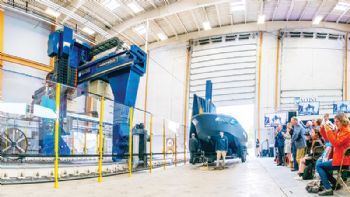
Earlier this month, the University of Maine (UMaine) Advanced Structures and Composites Center received three Guinness World Records (
www.composites.umaine.edu).
These were for the world’s largest prototype polymer 3-D printer (it can undertake both additive and subtractive operations), the largest solid 3-D printed object, and the largest 3-D printed boat.
The event culminated with the world’s largest (25ft 5,000lb) 3-D printed boat — named 3Dirigo — being tested in the Alfond W2 Ocean Engineering Laboratory (an offshore model-testing facility equipped with a high-performance wind machine over a multi-directional wave basin).
The new 3-D printer, which is designed to print objects up to 100ft long x 22ft wide x 10ft high, can print at a rate of 500lb/hr.
Moreover, it will be used to support several ‘ambitious initiatives’, including the development of bio-based feedstocks using cellulose derived from wood resources (Maine is the most forested state in the USA), and the rapid prototyping of civilian, defence and infrastructure applications.
A $20 million research collaboration with Oak Ridge National Laboratory (ORNL) will support “fundamental research in key technical areas in large-scale bio-based additive manufacturing”.
Indeed, the partnership between UMaine and ORNL will “advance efforts to produce new bio-based materials conducive to the 3-D printing of large structurally demanding systems”.
The research will focus on cellulose nano-fibre (CNF) production, drying, ‘functionalisation’ and compounding with thermoplastics, building on UMaine’s leadership in CNF technology and extrusion research.
“By placing CNF from wood into thermoplastics, bio-derived recyclable material systems can be developed with properties that may rival traditional materials — possibly even metals.”
The UMaine Composites Center received $500,000 from the Maine Technology Institute (MTI) to form a technology cluster to help Maine boat-builders explore how large-scale 3-D printing using economical wood-filled plastics can give the industry a competitive advantage.
The cluster brings together the expertise of UMaine researchers and marine-industry leaders to further develop and commercialise 3-D printing to benefit boat-builders in the state; and by 3-D printing plastics with 50% wood, boat moulds and parts can be produced much faster and more economically than by traditional methods.